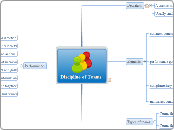
Discipline of Teams
Definition
Teams are not working groups because they require both individual and mutual acocuntability
A team is more than the sum of its parts
Usually smaller groups
Elements
common commitment and purpose
Develop direction, momentum, and commitment by working to shapre a meaningful purpose
Most successful teams shapre their purposes in response to a demand or opportunity put in their path
The best teams invest a tremendour amount of time and effort exploring, shaping, and agreeing on a purpose that belongs to them both collectively and individually
Translate common purpose into specific performance goals
performance goals
Goals help define a set of work products
Specificity facilitates clear communication and constructive conflict
Attainability of golas helps team maintain their focus
complementary skills
Technical or functional expertise
Problem solving and decision making skills
Interpersonal skills
mutual accountability
Types of teams
Teams that recommend things
Challenges
get off to a fast and construcive start
dealing with the ultimate handoff
Teams that make or do things
Teams that run things
Challenges
Determining whether a real team approach is the best one
Performance
Establish urgency, demanding performance standards, and direction
Slect members for skill and skill potential, not personality
Pay particular attention to first meetings and actions.
Set some clear rules of behavior
Set and seize upon a few immediate performnace oriented tasks and goals
Challenge the group regularly with fresh facts and information
Spend lots of time together
Exploit the power of positive feedback, recognition, and reward
